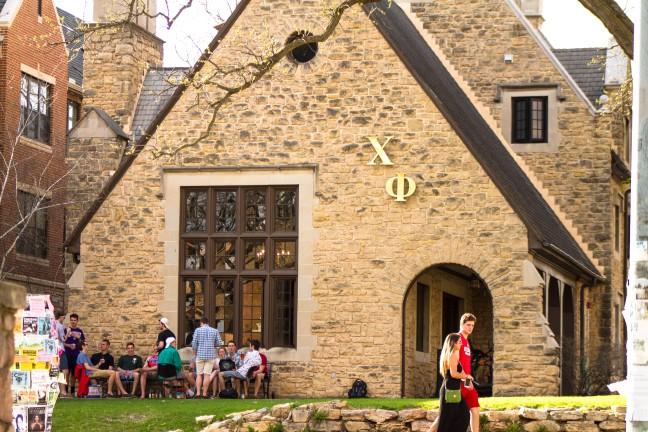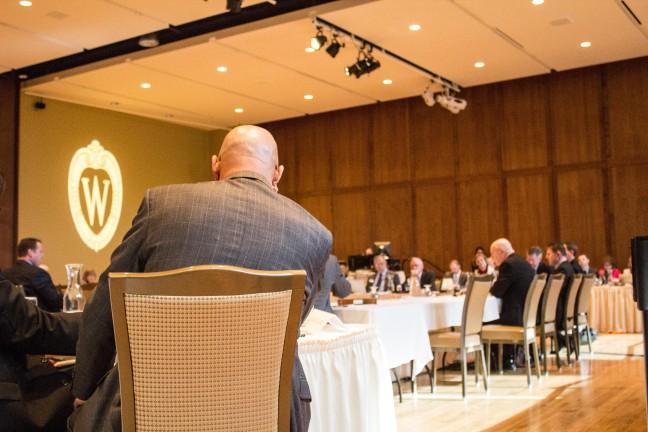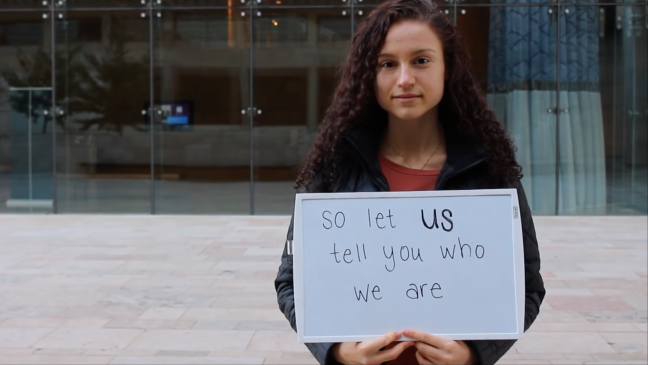From chanting racial slurs at the University of Oklahoma to curb stomping a casket during an initiation gone wrong on our own campus, Greek life wrongdoing headlines have increased in magnitude. It has now come to the point where the validity of fraternities as a means to establish and solidify camaraderie among the nation’s young men must be questioned.
In light of recent fraternity activities, behaviors and sentiments at University of Wisconsin and other college campuses, who (or what) is to blame for the unethical violations of human rights and demonstrations of racism that have landed several chapters in the news?
For many males, fraternities have been a staple of the collegiate experience. Many campuses offer Greek life as a place to connect with other individuals and promote intellectual and social development. Some of the primary reasons to join fraternities and sororities include the ability to contribute to a greater cause, meeting other people with similar aspirations and creating a sense of community within the greater university setting. This objective, in and of itself, is enough of a reason for many to join fraternities.
The problem with this one-dimensional assessment is found on a deeper level. In an effort to remain relevant and attract more people in an age when social media has largely replaced their purpose, this rationale has been rendered tantamount. In addition to the lengths the university already goes to encourage socializing, such as sanctioning student organizations other than Greek life, as technology has increased, so have the opportunities to make friends and acquaintances.
As a result, the goal of these organizations is no longer to offer a place to belong, but to establish an air of superiority and elitism. The high cost of membership, as well as the present connections that centuries-old organizations offer, contribute to this reputation.
This increasing sense of superiority has also coincided with the alarming frat-related activities that have come to light in the recent months. One can search for news involving fraternities and ethics violations and find several accounts at any time. On the day of this writing, for example, the University of Florida suspended its Zeta Beta Tau chapter after its members were accused of spitting, urinating and pouring beer on wounded war veterans on Panama City Beach. The lists of offenses at other schools contain further atrocities, including recent alcohol-related deaths at Rutgers University and the University of Nebraska – Lincoln, and the revocation of UW-Milwaukee’s Tau Kappa Epsilon chapter in December after four party attendees were allegedly drugged and consequently hospitalized last fall.
Many would say these events are isolated incidents; the media tends to sensationalize the stories in a way that makes them appear few and far between. But it is this very notion that makes them especially egregious. Although certain individuals have boldly spoken out against the system of institutionalized elitism, fraternities as a whole have yet to be held accountable for their actions.
These claims are just as often wrongfully cloaked in the equally elitist notion that the atrocities are “just part of being in a fraternity.” There is purpose to joining fraternities, and to get a slice of the elitist pie, one must blindly subject himself to whatever offensive, distasteful activities the fraternity deems acceptable.
It is possible that fraternities are pegged with a disproportionate amount of contempt when compared to other areas on college campuses where accusations of unethical behavior occur. Not all fraternities are as nefarious as the ones that make the news. Many, in fact, organize fundraisers and put forth efforts to better the community. That said, one must view the purpose of fraternities through the lens of their supposed mission when judging their activity. According to Chi Phi’s website, “Over 2,300 undergraduates and over 45,000 alumni work to instill a common set of values among worthy university men across the country and improve not only their undergraduate experience, but provide positive experiences.”
The national Chi Phi organization has condemned the UW chapter’s actions, but under this logic, the “common set of values” includes the belief it is acceptable to force pledges into “positive experiences,” like situations of suggested sexual assault, being hooded for more than eight hours and confinement to a small attic. Not to mention sending text messages such as, “I just really want [the pledge in the coffin] to suffer.”
These allegations that paint the sinister picture of one fraternity’s activities are enough to call into question why these actions are socially acceptable; why do many continue to condone, even encourage, such horrid, humiliating acts? The dismissal of any sense of wrongdoing is too often justified with “that’s what Greek life is.”
To best maintain the validity of this point, we must ask if it was “just part of Greek life” for the pledge, whose intoxicated fraternity brother kicked him in the coffin during the ritual, giving him a concussion. Apparently it was “just part of Greek life” for frat brothers at Dartmouth College to allegedly brand a pledge. In addition, Andrew Lohse, an ex-Dartmouth frat member, released different horror stories a few years ago to Rolling Stone.
Before challenging fraternities to change their ways and own their iniquities, we must ask why we hold them in high regard. There is a mystique to fraternity life that attracts many young men, but we must determine its substance. For many of these young men, the dedication to the cause is worth enduring torturous, embarrassing hazing, only to subject oneself to incidents of alcohol poisoning, sexual assault and racism on the other end. Before accepting an invitation to pledge, one must decide if the promise of friends and networking opportunities merits the most heinous of hazing rituals. As a nation, by continuing to idolize and value these institutions, which are seldom in the news for altruistic purposes, we are compromising our moral fiber.
There may not be a clear answer at this time, but with any great realization comes doubt. The dark nature of fraternities is more ominous than ever, but it has been rarely discussed. It’s time to start talking about it.
Kaden Greenfield ([email protected]) is a sophomore majoring in communication arts.





















